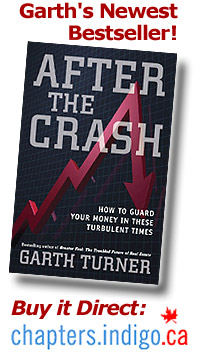February 5th, 2009 — Book Updates
The event some bloggers tried to crash. (And did.)

There are three immediate crises at the moment. Two more are lurking, latent. It’s the perfect storm.
The financial crisis has levelled trillions in wealth and had its zenith last fall. The real estate crisis will destroy trillions more, in a process which is just starting in this country. The economic crisis is now deepening and worsening it all, with job losses we have not seen for decades. And layered behind is the climate change crisis which will forever change how we use energy and where we live, and the inescapable and costly effects of demographics – our aging population.
As I explained my hypothesis to two audiences in Kelowna on Wednesday, the evidence was all around.
In this town, housing values have been dropping by thousands of dollars a month for most of a year now. Sales volumes have fallen off a cliff and I can’t find anyone who believes anything but crashing prices lie ahead. Worse, there’s snow here. Lots of snow. Inches of it fell a few days ago, and this winter is going down as one of the worst on record.
This, I’d say, is no fluke. Just the latest evidence that climate change is coming even to the Okanagan, where everyone can expect exactly what they did not buy into – cold, snowy, wet winters and torrid, arid summers turning the pines, already stressed by the beetles, into erect kindling.
At the same time as I was standing to do my thing, Hudson’s Bay was announcing 1,000 job cuts – the first of many waves of layoffs likely to hit that company. Our iconic store is shedding five per cent of its workforce, joining a long line of retailers who may be on their knees later in 2009.
In fact, the news from TD’s economists could not be more grim than it was this day. The bank’s Derek Burleton, a guy I know well as a moderate, was saying we should expect at least 300,000 more jobs to be trashed this year. That number equates to about 3 million in the United States, surpassing the 2.6 catastrophic jump in the unemployed there in 2008. Jobless people don’t buy cars or houses, and they scare the hell out of the rest of us. There but for the grace of God….
The perfect storm.
Big crowds in this place. There was a cancellation list for the past two weeks I’m told. And I’m very proud to say a few people who hang around this blog tried to crash and bamboozle their way in. I would expect no less of my flock. Bless you.
Once again, it is real estate and its now-inevitable demise which is gripping folks. Places like Kelowna have felt insulated from the outside world, because of all the baby boomer wealth tripping in from the snowy east and the nouveau riche sliding over the rocks from Alberta. But, of course, that is ending. People don’t move into those pricey houses hanging over Lake Okanagan when they can’t sell their digs back home. Reality is also arriving in the form of lost trucking jobs and shuttered plants.
Thursday I am flying back to Vancouver, for the last event of this trip. The organizer there tells me the hall they booked filled, so they got another one. Now it’s full.
These are times to pay attention. I’m pleased so many are. My journey is lightened because of it.
 But I miss Bandit. The storm can wait.
But I miss Bandit. The storm can wait.
February 4th, 2009 — Book Updates

The local real estate board had just announced disastrous numbers, but I’m not sure the people who came out to hear me on Tuesday night believed them. Or dared to.
Forty-five minutes east of Vancouver’s core, Surrey is an endless stretch of plazas, big box stores, industrial units and new houses jammed into every available corner. The growth here rivals that which has sprung up around Toronto’s flanks. In fact, add some snow, and this could be Whitby, Richmond Hill or Milton.
Like most of the Lower Mainland, and like the endless burbs of the GTA, real estate defines the community. It’s not culture, architecture, history or jobs that bring people to places like these, but rather big houses at a lower cost than is possible in the city. Still, prices are high and so is debt. The last thing anyone wants to hear is the latest news, used by a financial radical from Ontario to beat them up.
But the facts speak volumes. Sales in this market collapsed by more than half in January, to a point not seen in a quarter century. In all of this sprawling metropolitan area, a mere 762 houses changed hands, while 14,000 could not find buyers. At this rate, there are enough homes to sate buyer demand for a full year and a half, and yet things are about to get far worse.
It’s estimated at least 6,000 more listings will come on the market in the next 80 days, and yet there is absolutely no reason to believe many more buyers will materialize. That will help drive prices lower, and already Vancouver’s homes have lost 16% of their value.
In a city with the highest home prices in the country, which is less affordable than New York, London or LA, where real estate is an obsession often demanding 80% of net income to carry, this is a shocking thought. My audience listened to me say what they’ve seen is just the beginning, that home prices will be collapsing, then flatlining for years. But they didn’t wish to believe it. I saw that in eyes in every corner of the room in this swishy suburban golf club.
I guess Dave Watt has figured that out. He’s president of the Vancouver real estate board and says consumer confidence may be at low tide right now, “but the long-term strength and security of our housing market are beyond the reach of the economic clouds of today.
“Today’s short-term conditions are creating long-term opportunities. Buying opportunities have not been this strong in a decade, with low interest rates, broad selection, and more affordable prices.”
Buying opportunities? He bases that opinion on what, exactly?
Sales volumes in one of the country’s greatest cities have collapsed, even when it is just months away from hosting the Olympic Games, even though mortgage rates have tumbled and even when the average home is now $122,000 cheaper. Clearly the momentum is negative, and it’s growing stronger. For sale signs pepper the landscape and those once-trendy downtown condos are losing value by the day.
Any young buyers naive or manipulated enough to believe Dave Watt’s message and interpret this as an opportunity are walking into the jaws of a property trap. Vancouver real estate is sunk. It now officially joins the other urban sisters of decline.
But, of course, they didn’t believe me. Mr. Watt’s the pied piper. I’m the rat.
February 2nd, 2009 — Book Updates

Just as the apologists for the country’s biggest housing bubble were backpedalling on Monday. A reporter for the Vancouver Sun was trying to make me combust.
“Are you positive about anything?” he asked, showing typical journalistic objectivity. Then, “What if you’re wrong? What if people take action based on your statements?”
The questions belied the great trouble most people have believing a few simple truths. Like, this is the worst economic mess we’ve all been in for a very long time. Like, real estate will lead the destruction of personal wealth in Canada. Like, there is no recovery on the horizon. Like, government stimulus programs will fail. And, like, the people who need ragging on are those telling consumers they should be spending and buying, when we all need to be saving and hiding.
Just a week ago, the chief economist of the BC Real Estate Association was forecasting a shallow recession and a robust recovery, led by a visit to Abbotsford by Elvis. Now he says sales will drop by 9% in 2009 and prices decline by 13%. Says Cameron Muir: “The global financial crisis and worldwide recession will continue to take their toll on the B.C. economy this year.”
So, should investors have believed him a week ago, or believe him now? Actually, the correct answer is: Never. Economist Muir, I suspect, knows this depressing recession will likely shave a third off the inflated and unaffordable price of homes in his province, as it will in the GTA by the time things stabilize. But, being a paid shill for the industry, he’d have a hard time saying so.
That point I tried to make to the Sun reporter, who will likely finish me off in print in the morning. It’s not the rogue financial authors warning people to attack debt, prepare for the unknown, downsize and seize control of their lives who pose the problem. It’s those who – regardless of the economy or the dangers – push consumers to consume.
Contrary to realtor belief, a 10% or 20% price reduction does not constitute a buying opportunity when there’s another 30% bomb waiting to explode. The fact is Canadians allowed real estate values to inflate through herd buying. Then they rolled over as their government relaxed mortgage standards, turning the market into a blaze. Now they’re paying the price. Everybody’s equity is ablaze, and the destruction will continue for another year, perhaps much longer. I may be trashed for raising the alarm, but the real scrutiny must on those still throwing gas on the fire.
So, a professional sadness of mine is the apparent whoring of the Canadian media.
A year ago, as I related in my recent book, the real estate editor of a major newspaper who gave “Greater Fool” a full-page review (critical, but interesting) told me months later that was the kiss of death. After advertisers complained, he ended up on the overnight layout desk. The new real estate editor writes about funky paint colours and throw cushions.
But the sponsors left anyway. They smelled the smoke.
Tuesday’s delusions:
You can see what I mean by going here. And here. And here.

For today’s blog, ‘Bad Day,’ go here.

 But I miss Bandit. The storm can wait.
But I miss Bandit. The storm can wait.




